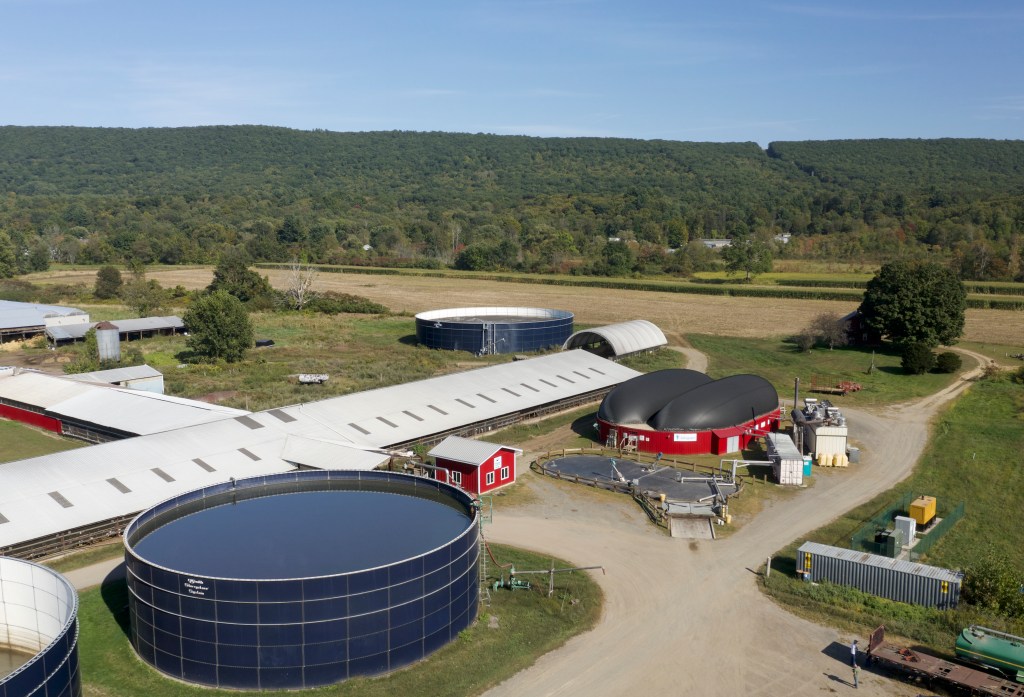Unilever, Starbucks are founding members in venture to turn food waste into energy
Vanguard Renewables makes renewable natural gas financially and logistically possible for farms and global brands. Read More

Vanguard Renewables has 6 digesters installed in farms in the Northeast and is planning for many more in 2021.//Courtesy of Vanguard Renewables
The promise of renewable natural gas is a sustainability win that has been financially and logistically out of reach for even the largest companies. Vanguard Renewables created the Farm Powered Strategic Alliance to start delivering on this promise for its founding members Unilever, Starbucks and Dairy Farmers of America.
The Massachusetts-based recycler uses anaerobic biodigesters to create renewable natural gas from food waste. Bacteria in the digesters consume the waste, creating methane and CO2 as byproducts. The gas can then be used for energy purposes.
Vanguard has seven recycling facilities in the Northeast plus one in Colorado and another in Georgia. It has installed six digesters on farms in Massachusetts and Vermont, and already has started collecting food waste from Unilever, Starbucks and Dairy Farmers of America’s manufacturing facilities.
By the end of 2021, the company expects to have 10 operating digesters with projects in construction in New York, Colorado, Georgia and Nevada and expand its membership to at least 10 other industry leaders. The biogas created is sold back to its members as well as pumped into local grids. A byproduct of anaerobic digestion process is a low-carbon fertilizer that has allowed farms to drastically reduce or eliminate synthetic fertilizers use and are increasing yield.
“Companies say, ‘It’s too hard for me. I just want to put all my waste out on the loading dock and have it go away at night,’” said John Hanselman, co-founder of Vanguard Renewables. “Our goal is to say, ‘No. Just like you recycle cardboard, and you recycle glass or plastics. Now it’s time to recycle food waste, and it’s not that hard. We’ll show you how to do it successfully.’”
Vanguard collects and recycles 700 tons of food waste and 250 tons of manure from farms and factories per day. Vanguard is even able to divert manufacturing byproducts previously not considered food waste to its facilities. Ben & Jerry’s previously directed the water used to clean its ice cream machinery to a water treatment plant. Now the water and residual ice cream slurry is a tasty dessert for the microorganisms in Vanguard’s digesters.
According to Michael Kobori, chief sustainability officer at Starbucks, Vanguard created a breakthrough in sustainable financing innovation. The company is creating a way for each organization, whether it be the dairy farmers, the large corporations or Vanguard’s investors, to economically benefit from being more sustainable. Vanguard is in charge of the logistics, taking that burden off the corporations and farmers. It also provides the funding, a huge barrier for many farmers who might have wanted to try anaerobic digestion in the past.
“If you were a dairy farmer interested in a digestive system, you had to pay for it yourself,” said David Darr, senior vice president and chief strategy and sustainability officer at Dairy Farmers of America. “You had to go to your bank and explore if you had the financial capability to invest in a multimillion-dollar anaerobic digester system. And you had to provide the management of that system. Those were major hurdles.”
Vanguard uses its longstanding capital from private investors and banks to fund the digesters. Its business model relies on the fees from collecting and recycling food waste and the sales of renewable natural gas to make a profit. All members of the Farm Powered Strategic Alliance have committed to buying back a portion of the gas produced from their waste and the rest will be sold to community grids.
Burning renewable natural gas is an easy sustainable shift for these companies. They don’t have to change anything about their operations or equipment. Just by plugging in a different tank, they are suddenly burning green gas instead of brown gas.
But beyond being an easy switch, renewable natural gas is actually carbon-negative. Collecting the methane gas created by anaerobic digesters prevents it from escaping into the atmosphere. And when the one molecule of methane is burned for energy, one molecule of CO2 is released and 2 molecules of water vapor. According to U.S. Energy Information Administration, this is much less CO2 than traditional fossil fuels and burning methan prevents methane from being released which is a much more toxic GHG than CO2. Switching to natural gas could significantly change the emissions profiles of these companies.
“It allows us to give this food waste, which we would consider to be unavoidable, a new purpose,” said Ale Eboli, head of supply chain for North America at Unilever. “We are generating a new form of energy that can significantly reduce our overall carbon footprint.”
Starbucks is targeting a 50 percent cut in its carbon footprint and water waste by 2030. Unilever has promised net-zero operations by 2030. As these vast and whole encompassing sustainability commitments inch closer year by year, the Farm Powered Strategic Alliance is a specific, tactical and very actionable step along the way.
“Most [companies] have made these net-zero pledges,” Hanselman said. “That’s a 30,000-foot commitment. We’re down around the one-foot level.”
Correction: A previous version of this article state that burning methane produces only water vapor. That is incorrect. Burning methane releases CO2 and water vapor but less CO2 that burning other fossil fuels.













